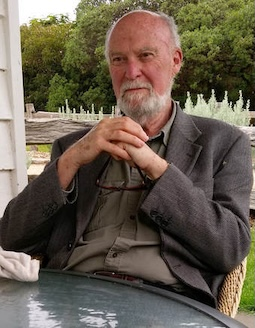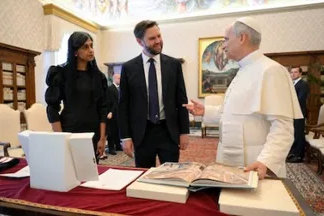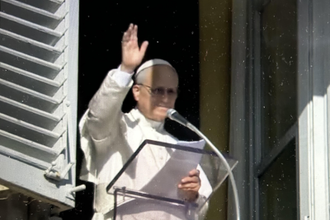Text: Dr Ian Linden's Storey Lecture: Option for the Poor - Foundations & Spirituality

Dr Ian Linden
Professor Ian Linden gave the Middlesbrough Justice & Peace Commission Storey Lecture on 8 May 2025, entitled: Option for the Poor: Foundations & Spirituality. The full text follows:
It is a pleasure to be with an audience that not only knows about the 'option for the poor' but, from your being on-line now, pursues its implications for us today. Sharing this search brings questions: not least how we got here, and what an option for the poor means for how we live in the world together.
Talking about spirituality can be individualist and airy-fairy. In contrast, the late Peruvian theologian, Gustavo Gutierrez, gave a down-to-earth definition for Christians in his Theology of Liberation. "A spirituality is a concrete manner, inspired by the Spirit, of living the Gospel….in solidarity with all human beings…before the Lord". We saw it at work in the papacy of Pope Francis. This spirituality that arises from God's compassionate option, predilection, preference for the poor, is revealed, and called for, in the Prophets of the Old Testament, in the New Testament and the teaching of the Church over the ages.
Three Gospel writers carry the story of the rich young man seeking salvation. Mark recounts how Jesus "looked at him and loved him", giving him the counsel of perfection to unburden him from his wealth. He goes away disappointed seemingly rejecting an "inner detachment" to retain his wealth and continue his search. Gutierrez insists Christians need to pursue a search for "integral liberation".
From the Acts of the Apostles we know that the first Christian community sought to have all things in common. By the 4th century AD, after Constantine's conversion, this commonality of the goods of creation, in today's churchy language, the "universal/common destination of goods", entailed a duty of the rich towards the poor. The Church Fathers, in Pope Paul VI's words, proclaimed it "in no uncertain terms".
These early saints don't make easy reading. "The bread in your larder belongs to the hungry. The clothes in your wardrobe belong to the naked…. The money in your vaults belong to the destitute". This is St Basil the Great of Caesaria (died 379). No less uncomfortable, the social teaching of the time makes short-shrift of our perception of charity. "You are not making a gift of your possessions to the poor person. You are handing over to him what is his". This is the Archbishop of Milan, St. Ambrose (died 397). No rhetoric this: priests could be rejected for the office of bishop if they were not seen as "lovers of the poor".
St Augustine of Hippo, Algeria ( died 430) - converted by Ambrose - softened the teaching a little by focusing his strictures on superfluity as in "when you possess superfluity you possess what belongs to others". St John Chrysostom (died 403), Archbishop of Constantinople, had written a number of sermons on wealth and poverty in this vein; hoarding riches was "robbery of the poor". And there were no get-outs: however bad a character, "the man who has encountered the shipwreck of poverty, do not judge him, do not seek an account of his life, but free him from his misfortune". You can almost hear a contemporary discussion about street begging.
Dwelling a moment on the theological principles and admonitions of the 4th century does not seek to induce a sense of guilt. It is meant to underline how utterly foundational right relationships with the poor have been - of course with varying emphasis - for Christianity across the ages. The vow of poverty in most Religious Orders remains a testimony to this teaching.
So much has to be left out in a potted history not least the Franciscans and St Francis who was so formative for Pope Francis. "Was the earth made to preserve a few covetous, proud men to live at ease; or was it made to preserve all her children?" Could be Francis. In fact it's Gerrard Winstanley in 1649 post-Reformation England, founder of the True Levelers. The option for the poor wasn't suddenly 'dreamed up' in the 1960s.
Church teaching about the poor shows the development that St. John Henry Newman outlined in his famous essay on doctrine. It was no accident that poverty returned mid-20th century to greater prominence in Church thinking. The Church globally was in intense competition with Communism for the soul of the working class. The worker-priest movement in France was one of several initiatives. They lost a protective ally when the then Nuncio, the future Pope John XXIII, was made Patriarch of Venice in 1953.
Movements for peace and international development were not siloed like today. In the midst of the Korean War (1950-1953), calls for peace were growing. Amongst the public response in 1952, Harold Wilson -Labour had just lost the General Election - put forward a Plan for World Development which generated the NGO, War on Want. This was when, referring to nations non-aligned in the Cold War, the term Third World was first used.
At the same time, the Brazilian Bishops Conference (CNBB) was coming into existence. Dom Helder Camara was its first general-secretary and began CARITAS Brazil, feeding the impoverished peasants of the North-East and working with government on a development plan for the region where he became Archbishop of Olinda-Recife. In 1955, the Latin American bishops joined together to form an episcopal Council, CELAM, through which ideas could quickly spread. Meanwhile 29 developing nations met in Bandung, Indonesia, to discuss economic development, decolonization and peace.
On 11 September 1962 in a radio broadcast, by way of a papal prologue to the Second Vatican Council, Pope John XXIII described how the Church presented itself to the world, "how it is and how it wants to be as the Church of all, particularly, as the Church of the poor". With a passion that characterized the Church Fathers, he spoke of "the miseries of social life that cry out to God for vengeance in the sight of God". But nothing substantial on poverty came out of the Council.
Why did the Pope's words and the Council's opening Message to the World that spoke of poverty, not result in a distinct Conciliar document? It wasn't for lack of trying, not least by Dom Helder and an informal 'Church of the Poor' group who wanted the Council to take the scourge of poverty to its heart. The problem was the variety of perspectives that the delegates and periti brought to the table. Alongside Helder Camara's big economic theme of 'underdevelopment' in the Third World were emphases of the European worker priest movement, the influence of Charles de Foucauld's Little Brothers of Jesus, his asceticism and love of Nazareth, and the Vatican's growing discomfort with its manifest wealth. There were just too many different clerical chefs in the kitchen.
Gaudium et Spes, the last and hurried, document to be voted on, was influenced by the Latin Americans, and by Dominican Father Louis Joseph Lebret who played a major role in writing Paul VI's subsequent 1967 Populorum Progressio. It did touch on the injustices of the global economic order. It also referred back to the Church Fathers' requirement to come to the relief of the poor, adding "and to do so not merely out of their superfluous goods", the uncertain meaning of 'superfluity' having long since blurred the obligation. The document, of course, underlined the essential link between justice and the preservation of peace. But it all felt a bit last-minute. The Latin Americans went home with a determination to take action. The strength of Gaudium et Spes was to be a green light for the local Church to take forward the thinking and practice of a "Church of the Poor".
Meanwhile the theological implications of the Church's option for the poor were being worked out in conferences around Latin America. In 1968, the second big conference of the Latin American Bishops took place in Medellin, Colombia. During it Gustavo Gutierrez presented his outline "Towards a Theology of Liberation". Elaborating themes of structural injustice, conscientization and the search for liberation, the seminal Pedagogy of the Oppressed with its central theme of conscientization was published in Portuguese the same year. Its author, Paolo Freire, had been Director of Extension Studies in the University of Recife in the early 1960s and briefly imprisoned after the 1964 military coup. Medellin and its option for the poor profoundly influenced what came out of Rome in subsequent years.
Alongside individual sins, the Latin American bishops spoke of social, economic and political structures that did violence to people. Passivity in the face of injustice required an awakening leading to action to counter such violence: a popular mobilization and movement for change. The goal: to enable the poor to become more conscious of the causes of their predicament and to support them in seeking their own integral liberation. In the face of military dictatorships, death squads and rule by ruthless oligarchies, committed to solidarity with oppressed communities, the bishops weighed up advocating violent revolution. They came down against it in a hard-nosed estimation of its consequences.
Gustavo's Theology of Liberation: Perspectives was published - in Spanish, in 1971, in English 1973. It chimed in many ways with Paul VI's contemporary apostolic letter to the Pontifical Commission for Justice and Peace, Octogesima Adveniens that underlines the diversity of political contexts in which work for social justice takes place and the importance of reading the signs of the times from different perspectives, an elaboration of Cardijn's "See, Judge and Act" approach in short.
This was followed by Justice in the World from the 1971 Synod of Bishops of Rome. Like Medellin, it deploys the concept of structural injustice and conscientization but, unlike Medellin, speaks of liberation through development, a concept it critically appraises. It is at this Synod, in the words of bishops from around the world, that "action on behalf of justice and participation in the transformation of the world" are described as "a constitutive dimension of the preaching of the Gospel". Not a barely tolerated add-on to the 'real' work of the Church..
So what of today? Let's be honest. We are not all cut out for more radical forms of solidarity with the poor. We don't see a Dorothy Day when we look in the mirror. What can and cannot be done effectively differs in democracies and dictatorships. In democracies, the option for the poor can mean in practice advocating pro-poor policies to governments by dialogue, argument, organizing and modelling good, effective examples, and when necessary creative forms of protest. The distinction between religion and politics never has been and never can be real. Both are, and ought to be, about how we should live, what kind of society and world we wish to live in.
So the spirituality of the option for the poor requires practicing the politics of a compassion for the poor that is God's option. Action on behalf of justice, solidarity shown by confronting systemic injustice, including, because of climate change, towards future generations, trying to rebuild, these all form part of "the concrete manner…of living the Gospel inspired by the Spirit" - Gustavo's definition of spirituality. They offer special opportunities for Grace to enter.
And let's be realistic. In the long march through the institutions Justice and Peace remain distant horizons. Action for justice meets so often with defeat. The opposition seems intractable. Fleeing Franco's Nationalists, the Spanish poet, Antonio Machado, an exile across the border in Collioure, wrote: "For the strategists, for the politicians, for the historians, all this will be clear: we lost the war. But at a human level I am not so sure: perhaps we won".
Machado wrote his famous poem Caminante no hay camino during the first World War. "Traveler there is no path - we make the path by walking". We see our path only by looking back. But following the life of our beloved Pope Francis, who modelled an option for the poor for all of us, we will surely emerge from our own troubled times one day on the Emmaus road.
See a recording of the talk here:
https://us02web.zoom.us/rec/share/1e73gSK_ggpuNZ6nXnvwp1PIWIqIcZwKvo8yKiuGWugWm-uErS5DIrjxDZK2fMwj.ZGx09iNvzsW6M_9b
Passcode: @Pc=W$2q
Professor Ian Linden is Visiting Professor at St Mary's University, Strawberry Hill, London. A past director of the Catholic Institute for International Relations, he was awarded a CMG for his work for human rights in 2000. He has also been an adviser on Europe and Justice and Peace issues to the Department of International Affairs of the Catholic Bishops Conference of England and Wales. Ian chairs a new charity for After-school schooling in Beirut for Syrian refugees and Lebanese kids in danger of dropping out partnering with CARITAS Lebanon and work on board of Las Casas Institute in Oxford with Richard Finn OP. His latest book was Global Catholicism published by Hurst in 2009.


















